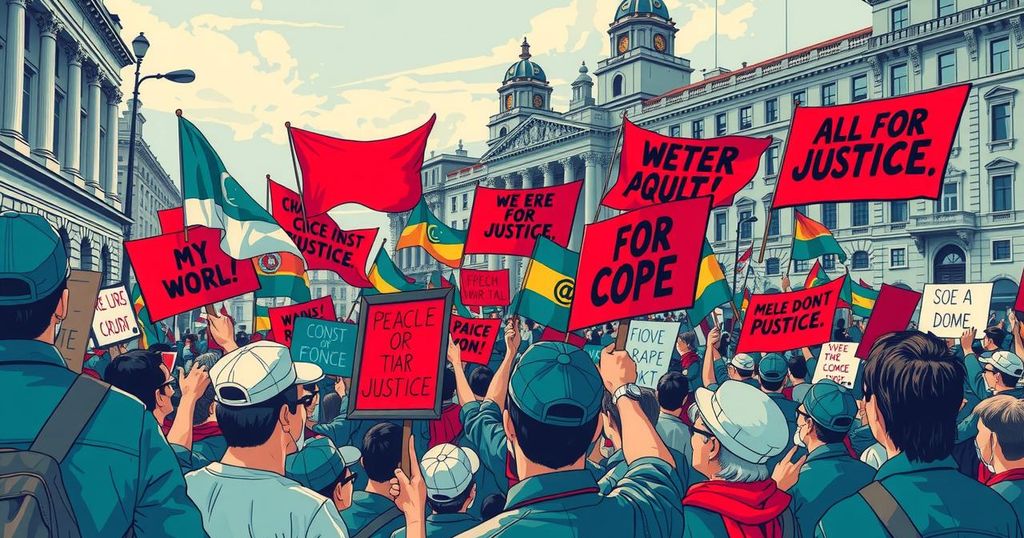Protests Erupt in Kenya Following Death of Activist Albert Ojwang in Police Custody
Protests have erupted in Kenya following the death of activist Albert Ojwang in police custody. Arrested for online criticisms of the police, his death has drawn skepticism over police explanations of self-harm and renewed calls for accountability. With the anniversary of past protests approaching, activists warn against complacency and push for justice.
Protests have erupted across Kenya following the tragic death of activist Albert Ojwang while in police custody. Ojwang was arrested over the weekend after the police accused him of damaging their reputation through social media commentary. His untimely death comes at a crucial time for the nation, approaching the one-year mark since protests began against government corruption and unpopular tax reforms.
Ojwang died just hours after his arrest, which centered around accusations he made on his blog and social media criticizing the police. While police claim that he harmed himself by banging his head against a wall in his cell, his family and supporters are vehemently disputing that narrative. An autopsy originally planned for Monday was postponed, and the results are now awaited on Tuesday, with many hoping for clarity surrounding his death, according to local reports.
Albert’s father has reportedly been waiting at the morgue for many hours, expressing skepticism toward the police’s explanation, opting instead to highlight the myriad unanswered questions surrounding his son’s circumstances. The family’s lawyer, Julius Juma, emphasized uncertainty regarding the cause of death. He raised concerns about why Ojwang was placed in solitary confinement, and noted injuries present on his body: “His head was completely swollen, and there were numerous injuries—to his head, hands, and shoulders.”
The atmosphere at the morgue has drawn several human rights activists seeking justice, including Hussein Khalid, the lead of Vocal Africa. Khalid proclaimed, “We say: ‘enough is enough’. We have lost too many lives at the hands of the police,” signaling a growing call for accountability in the country.
On Monday, protests took place in Nairobi, starting at the Central Police Station where Ojwang died. The protests turned confrontational when police used tear gas to disperse demonstrators. According to police, Ojwang was found unconscious in his cell—and died shortly after being taken to the hospital. However, the accounts surrounding his death have left many skeptical, leading to calls for transparency in the police’s actions.
In response, authorities have announced the suspension of all officers who were present during Ojwang’s custody while the Independent Policing Oversight Authority investigates. Police Inspector-General Douglas Kanja has reiterated that those responsible will face consequences, though many activists remain doubtful of justice being served.
Amnesty Kenya has issued a statement calling for accountability and transparency regarding Ojwang’s arrest and subsequent death, stating that the results of the oversight authority’s investigation should be made public, and those found culpable must face consequences.
This incident echoes prior tragedies within the context of government crackdowns, stirring memories of past violence. As one activist, Ndungi Githuku, noted, “We have freedom that is half baked… the killings are still happening.” Githuku warned that anger is still potent among the populace, as frustrations from last year’s protest movements persist without resolution.
The outcry over Ojwang’s death has sparked a renewed wave of protests, and as Githuku suggests, the government’s actions appear to be pushing citizens back to the streets. In the coming days, many anticipate a significant demonstration, especially with the anniversary of last year’s turmoil on the horizon. Activists express that they will not remain silent; instead, they are determined to rally for justice and accountability, refusing to be intimidated into complacency.
As tensions continue to rise in Kenyan society, the tragic incident involving Ojwang might very well reignite widespread calls for change and reform across the nation.
In summary, Albert Ojwang’s death in police custody has ignited significant protests across Kenya, echoing concerns over police violence and government accountability. Despite police claims that Ojwang injured himself, skepticism remains high among family and activists alike. The ongoing investigation, amidst a backdrop of historical mistrust and unresolved grievances, suggests a potential resurgence of public unrest as Kenyans demand justice for Ojwang and speak out against systemic issues impacting their rights and safety.
Original Source: www.rfi.fr




Post Comment